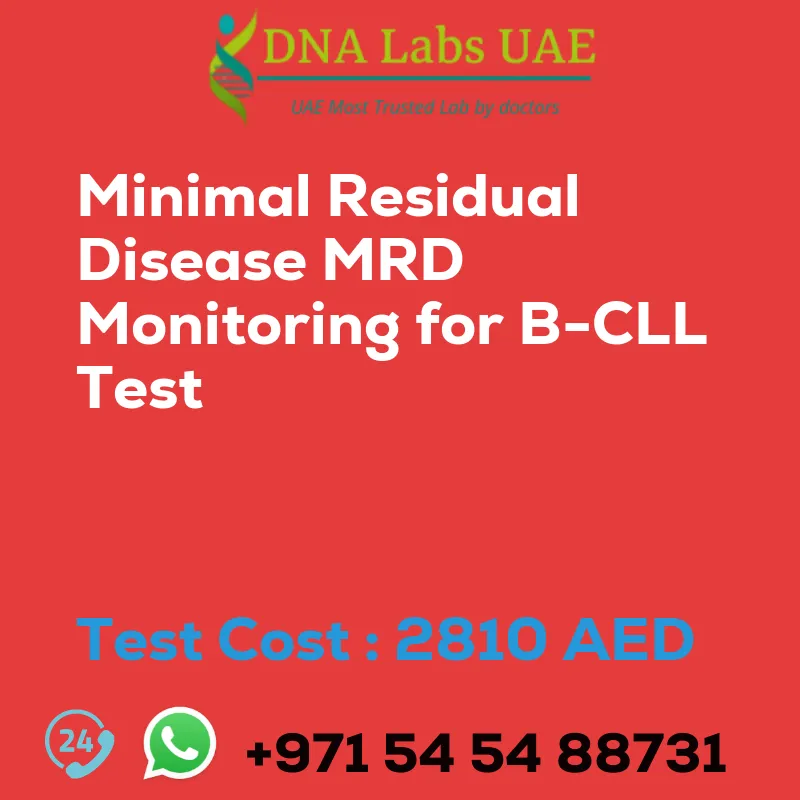MINIMAL RESIDUAL DISEASE MRD MONITORING FOR B-CLL
Test cost: AED 2810.0
Symptoms, Diagnosis, and Referring Details:
- Test Name: MINIMAL RESIDUAL DISEASE MRD MONITORING FOR B-CLL
- Components: Bone Marrow (3 mL, 1 mL min.) in 1 Green Top (Sodium Heparin) tube and Whole Blood (4 mL, 3 mL min.) in 2 Green Top (Sodium Heparin) tubes. Mix thoroughly and ship immediately at 18-22°C or 2-8°C. DO NOT FREEZE.
- Sample Condition: Sample time point (Chemotherapy time points), Previous diagnostic immunophenotype report, Clinical history and original TRF, Date and time when sample was drawn to be mentioned on the TRF, Therapy details, 2 or 3 unstained BMA smears or Peripheral smears to be made at source.
- Report Delivery: Sample daily by 11 am; Report within 3 working days
- Method: FLOW CYTOMETRY
- Test Type: Leukemia
- Doctor: Hematologist, Oncologist
- Test Department: FLOW CYTOMETRY
- Pre Test Information: Sample time point (Chemotherapy time points), Previous diagnostic immunophenotype report, Clinical history and original TRF, Date and time when sample was drawn to be mentioned on the TRF, Therapy details
Test Details
The Minimal Residual Disease (MRD) monitoring test for B-cell chronic lymphocytic leukemia (B-CLL) is a diagnostic tool used to assess the presence and level of residual cancer cells in the blood or bone marrow of patients who have undergone treatment for B-CLL.
MRD refers to the small number of cancer cells that may remain in a patient’s body after treatment, even when they are undetectable by conventional methods such as physical examination or imaging tests. These residual cells can potentially lead to disease relapse or progression.
The MRD monitoring test utilizes highly sensitive techniques such as flow cytometry, polymerase chain reaction (PCR), or next-generation sequencing (NGS) to detect and quantify the presence of cancer cells at a molecular level. These techniques can identify and measure the number of cancer cells in the blood or bone marrow sample, even when they are present at very low levels.
MRD monitoring is typically performed at regular intervals during and after treatment to assess the effectiveness of therapy and to provide valuable information for treatment decisions. By monitoring MRD levels over time, healthcare professionals can determine if the treatment has successfully eliminated the cancer cells or if further intervention is necessary.
The results of MRD monitoring can help guide treatment decisions, such as the need for additional therapy, the duration of treatment, or the need for close surveillance. It can also provide prognostic information, as patients with higher MRD levels are generally at a higher risk of disease relapse.
Overall, MRD monitoring for B-CLL is a valuable tool in the management of patients with this type of leukemia, as it allows for a more personalized approach to treatment and improves the overall outcome for patients.
| Test Name | MINIMAL RESIDUAL DISEASE MRD MONITORING FOR B-CLL Test |
|---|---|
| Components | |
| Price | 2810.0 AED |
| Sample Condition | 3 mL (1 mL min.) Bone Marrow (first pull aspirate) in 1 Green Top (Sodium Heparin) tube AND 4 mL (3 mL min.) whole blood in 2 Green Top (Sodium Heparin) tubes. Mix thoroughly & Ship immediately at 18\u0192??22?\u00f8C or 2-8 deg ?\u00f8C. DO NOT FREEZE. Following information is mandatory:\n Sample time point (Chemotherapy time points); Previous diagnostic immunophenotype report; Clinical history and original TRF;Date and time when sample was drawn to be mentioned on the TRF; Therapy details; 2 or 3 unstained BMA smears or Peripheral smears to be made at source. |
| Report Delivery | Sample Daily by 11 am; Report 3 Working days |
| Method | FLOW CYTOMETRY |
| Test type | Leukemia |
| Doctor | Hematologist, Oncologist |
| Test Department: | FLOW CYTOMETRY |
| Pre Test Information | Following information is mandatory: Sample time point (Chemotherapy time points); Previous diagnostic immunophenotype report; Clinical history and original TRF;Date and time when sample was drawn to be mentioned on the TRF; Therapy details. |
| Test Details |
The Minimal Residual Disease (MRD) monitoring test for B-cell chronic lymphocytic leukemia (B-CLL) is a diagnostic tool used to assess the presence and level of residual cancer cells in the blood or bone marrow of patients who have undergone treatment for B-CLL. MRD refers to the small number of cancer cells that may remain in a patient’s body after treatment, even when they are undetectable by conventional methods such as physical examination or imaging tests. These residual cells can potentially lead to disease relapse or progression. The MRD monitoring test utilizes highly sensitive techniques such as flow cytometry, polymerase chain reaction (PCR), or next-generation sequencing (NGS) to detect and quantify the presence of cancer cells at a molecular level. These techniques can identify and measure the number of cancer cells in the blood or bone marrow sample, even when they are present at very low levels. MRD monitoring is typically performed at regular intervals during and after treatment to assess the effectiveness of therapy and to provide valuable information for treatment decisions. By monitoring MRD levels over time, healthcare professionals can determine if the treatment has successfully eliminated the cancer cells or if further intervention is necessary. The results of MRD monitoring can help guide treatment decisions, such as the need for additional therapy, the duration of treatment, or the need for close surveillance. It can also provide prognostic information, as patients with higher MRD levels are generally at a higher risk of disease relapse. Overall, MRD monitoring for B-CLL is a valuable tool in the management of patients with this type of leukemia, as it allows for a more personalized approach to treatment and improves the overall outcome for patients. |








